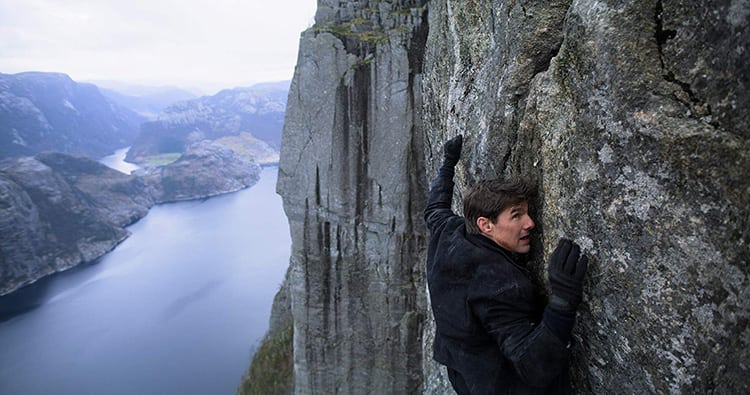The “Mission: Impossible” series is the greatest action franchise in the history of cinema. Think about it: there is no other action franchise without a single bad movie to its name. The Bond films are all over the quality map, franchises like “The Fast and the Furious” were never good to begin with, and even classics like the “Die Hard” and “Bourne” series tarnished their legacies with their fourth and fifth entries. “Mission: Impossible” has stayed consistently great over twenty-two years and six movies, all directed and written by different teams of filmmakers. Its weakest entry is still a cheekily ridiculous John Woo romp. This spy franchise is a bona fide miracle.
In its continued mission to shatter expectations, the fifth movie in the series—2015’s “Rogue Nation”—was arguably the best one yet. It recruited director Christopher McQuarrie, who had previously worked with immortal stuntman Tom Cruise on “Jack Reacher.” McQuarrie’s success landed him the job of writing and directing “Mission: Impossible – Fallout”, making him the first filmmaker in the franchise’s history to helm two entries.
He doesn’t take that honor for granted. “Mission: Impossible – Fallout” is unique among the rest of the franchise, both structurally and narratively. McQuarrie plays with action genre conventions while raising the bar for action sequences—he simultaneously reinvents the wheel and refines it to spin better than ever.
His impressive talents are as prominent in “Fallout” as they were in “Rogue Nation”. He refuses to forget character even among chaotic brawls, choreographing fight scenes to underline personalities. Ethan Hunt fights like a seasoned but exhausted pro, Ilsa Faust with practiced accuracy; Henry Cavill’s CIA agent pulls punches with American bluntness; Benji exudes scrappy determination. The screenplay’s character traits come through in jabs both verbal and physical.
The visual wit is just as fun, thanks to McQuarrie’s command over the frame. Working closely with cinematographer Rob Hardy, whose precise eye lit up the brainwaves of sci-fi masterpiece “Ex Machina,” McQuarrie shoots the most insane set pieces imaginable with breathtaking clarity. The visual marvel of “Mission: Impossible – Fallout” is the cinematic antonym of shaky cam. Never have car chases, sky dives, and bomb diffusions created so much tension.
It’s the movie’s structure that opts for innovation rather than perfection of the old. Rather than employing the most stunning sequences early on as attention grabbers—à la the original’s hanging-above-the-floor heist and the Vienna State Opera scene in “Rogue Nation” — “Mission: Impossible – Fallout” slowly escalates from beginning to end. Every set piece is more thrilling than the last, ratcheting up until a dizzyingly entertaining series of events in the third act. This balanced, patient pacing helps the story retain a mindfulness that’s absent from many action movies, though the final sequence is sure to blow minds through sheer exhilaration.
This experimental structure is also the movie’s one weakness. When you know that the current action scene is sure to be followed by a better one, the current scene’s power wanes slightly. “Mission: Impossible – Fallout” loses the unpredictability that more sporadically paced action movies offer. McQuarrie is onto something with his method in “Fallout,” though, and seeing this formula improved could yield exciting results.
The “Mission: Impossible” movies usually stand-alone from a plot perspective, but “Fallout” is the first entry in the series that requires a working knowledge of the franchise in order to understand all the emotional beats. Investment in the other five entries pays off spectacularly, though: “Fallout” picks up unresolved threads from the third, fourth, and fifth movies and ties them up in satisfying fashion. It manages a mix of grand and personal that feels precious in a movie this busy.
Not that this busyness is a bad thing — “Mission: Impossible – Fallout” is a consummate blast in every second, showcasing a filmmaker and a franchise at the height of their powers. It’s incredible enough to make you forget that it stars a powerful man with a history of manipulating women through his cult. If Christopher McQuarrie has the skill to put “Fallout” together, he can make the next sequel work with a different actor at the forefront.
★★★★½ (4.5/5)




